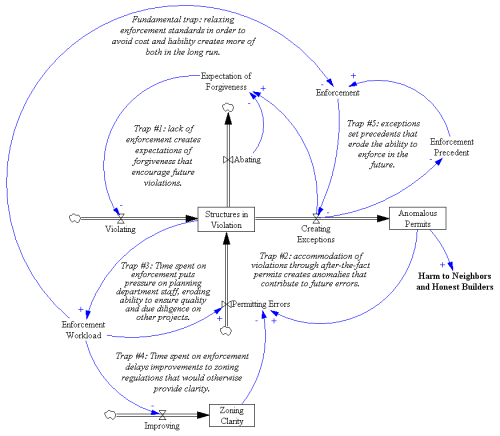I’m playing a big role in a local effort to get the regulations of our zoning district enforced in the case of an egregious violation. Our planning and zoning commission’s habit, and apparent preference in this case, is not to enforce. Instead, it is proposed to enable the violation through a PUD amendment, and issue a trivial fine ($200, or 0.2% of the stated value of the structure).
Unfortunately, this proposal is illegal, because it contradicts existing covenants and a variety of goals and specific provisions of our General Plan and Zoning Regulation. This action might make sense if it were a naked political ploy to undermine the zoning through administrative rather than legislative means, which I hope is not the case. I think it is more likely an effort to “play nice” with violators and to avoid costly enforcement action.
If so, the resulting weak enforcement posture is a short-sighted avoidance of conflict, that encourages far more problems in the long run. As the diagram below illustrates, backing down on the case at hand solves the immediate problem, but has terrible consequences.
- The precedent for non-enforcement and amendments to legalize violations erodes the legal basis for future enforcement actions.
- Accommodation creates an expectation of forgiveness, encouraging owners and builders to violate in the future.
- Exceptions created to accommodate violations make planning documents and title histories more complex, creating more opportunities for errors.
These side effects of lax enforcement accumulate. As violations mount, time that could be spent on productive activity (ensuring a thorough permitting process, or revising zoning regulations to clarify standards and streamline processes) gets squeezed out by time wasted on enforcement.
These reinforcing feedbacks create a deadly trap, into which the unsuspecting can easily step. Once triggered, the vicious cycle creates more pressure to relax enforcement standards, capturing the county in an undesirable equilibrium with many violations and no meaningful enforcement. Ultimately, the citizens (who initiated the zoning district) suffer from the side effects of density granted to violators, that is unavailable to those who comply with the law.
Fortunately, with a little fortitude, the process can be reversed. A single forceful enforcement action has a salutary effect on expectations, stemming the tide of violations and freeing up time for the improvement of regulations. There’s still the hangover of side effects of past accommodation to contend with, but surely the withdrawal is better than the addiction to accommodation.


Tom, I am afraid you may be talking way over the comprehension level of Mr. Lawson.